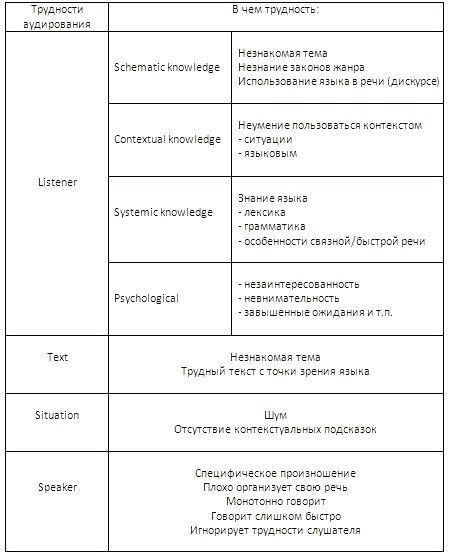Are you learning English and are you wondering how to understand English by ear? Use the suggested tips to “accustom” your ears to foreign speech. Take your first steps towards understanding English!
Those who study English have heard more than once about the language barrier, and this refers specifically to the fear of speaking a foreign language. However, few people mention that there is also a hearing barrier, that is, poor understanding of speech by ear. What causes this obstacle and how to destroy it? Let's reason together!
Reasons for the appearance of a hearing barrier

A wise old owl
Sat in an oak.
The more he saw,
The less he spoke.
The less he spoke,
The more he heard.
Why can't we be like
That wise old bird.
- Features of personality type. In the article “” we talked about visual, auditory, kinesthetic and digital learners. If you are not an auditory learner, you may have a hard time understanding English by ear. These are innate or acquired abilities; it is impossible to radically change them, but you can develop in yourself those qualities that you lack.
- Neglect of listening. Some people don’t know how to approach audio recordings or where to start their learning, so they don’t spend any time developing this important English language skill.
- Low level of knowledge. Remember at what level you know English (if you find it difficult to make an objective assessment, ours will help you), what is your speech rate when you speak it. You will be able to understand speech at approximately the same pace, so develop all the skills together.
- Ignorance of short forms and slang in spoken English. For example, want to is replaced by wanna, and this creates difficulties in understanding live speech. If you don't know these abbreviations, this expression may confuse you.
- Too difficult material. There are rumors on the Internet that you can learn English from scratch “just” by watching the series “Friends” / “How I Met Your Mother” / “House”, etc. in the original. These are wonderful series, but they are completely unsuitable for or, at these levels of knowledge people do not yet have the necessary vocabulary and other skills, so they will not understand speech well and may be completely disappointed in their abilities.
How to learn to understand English by ear: some useful tips
1. Listen to a variety of audio materials regularly
It is impossible to learn to dance by watching couples waltz, you need to start dancing yourself! How can you understand English by ear without making any effort? Rather, move from theory to practice, from words to deeds. Listen to audio lessons, podcasts, songs, watch films and TV series in English (focus on your level of knowledge). The main thing is to choose interesting material for yourself. Try to awaken your interest and love listening, then it will be much easier to do it.
What resources can you use:
- will give you a lot of pleasure and help you understand English language by ear;
- and add it to your bookmarks and visit at least a couple of times a week;
- to find out how well you have become in your listening comprehension of English and to test your spelling skills, visit one of
It is not doing the thing we like to do, but liking the thing we have to do, that makes life blessed.
The real blessing is not only doing what you love, but also loving what you have to do.
Another important point: Exercise regularly. If you spend at least 20-30 minutes daily listening to various audio recordings, you will feel little progress in just a couple of weeks. If this becomes your good habit, after a few months you can improve your listening comprehension of English (the period depends on your abilities and the presence of an ear for music).
2. Study with audiobooks
Audiobooks themselves are an excellent resource for developing listening skills. However, if you find it difficult to understand the speaker's speech, then listening can turn into real agony. In this case, we recommend using a wonderful technique for working with audiobooks. Find the text of the recording and read it to yourself in parallel with the announcer. After 10-20 minutes, you will get used to the pace of speech and the speaker’s voice, and it will be easier for you to recognize words by ear. Close the text and listen to the audio recording. You may not understand every word, but you will notice that you catch most of what the announcer is saying. And if you listen to a book every day, then after a while you will calmly do without text. Read our article “”, in it you will find a detailed guide to choosing a book, effective technique working with it and 7 sites where you can find free materials for studying.
3. Increase your vocabulary
The larger your vocabulary, the easier it will be for you to perceive speech by ear. You will not be able to understand native speakers until you acquire a decent “baggage” of words. Special attention pay attention to colloquial vocabulary, all kinds of abbreviations, as well as interjections. Oddly enough, but ignorance of the simplest Eh, Oh, Uh, Um can confuse you: you will think that this is part of an unfamiliar word and lose the thread of the story.
Don't forget to learn idioms and slang expressions, they are often used in spoken English. They are especially popular among young people, so if you want to watch a series or listen to a song by your favorite artist, be interested not only in the “classics”, but also in modern vocabulary.
4. Develop grammar skills
Don’t be surprised, knowledge of grammar also plays an important role in removing the hearing barrier. You don’t need to memorize all the rules, but the difference between “What do you do?” and “What are you doing?” need to understand.
5. Improve your own pronunciation
If you yourself learn to pronounce words correctly, then it will be easier to recognize them in someone else’s speech. The principle is simple: when you learn a word, you also learn how it “sounds”, so you can easily recognize it in spoken language. When learning new vocabulary, open the Lingvo dictionary (or any other electronic reference book convenient for you) and listen several times to how to pronounce this word, try to copy the accent of a native speaker. Now that you hear this vocabulary, recognizing it will not be so difficult. And to learn to pronounce english sounds That’s right, we recommend that you read our article “”, where you will find useful training videos for improving pronunciation.
6. Speak more English

Communicate in English as often as possible with your teacher, course classmates, friends studying the language, and foreigners. This way you can hear “live” speech and get used to the fact that English can sound different, because each person has their own pronunciation and accent. And if you want not only to talk with your interlocutor, but also to increase your level of knowledge, we suggest signing up for. Our teachers will help you speak quickly and correctly.
7. Learn to think in English
This is a very useful habit. It’s not easy to develop, but the skill will come in handy more than once. When you read or listen to any text, you do not need to mentally translate it into Russian. Don't think about translation at all. This is why it is so important to choose information that is interesting to you: you will be carried away by the story and will not be distracted by literal translation.
8. Take advantage of all technological advances
Do not neglect the “miracles of scientific and technological progress.” It happens that it is difficult for a person to understand English by ear, even if the recording is quite clear. The slow-motion playback function will help you out; virtually every new video and music player has it. Reduce the playback speed until you can hear the speaker's speech.
9. Actively seek opportunities to practice listening.
Busy people don’t always have the opportunity to watch TV series, but you can find a couple of minutes to install a special application on your tablet or smartphone, for example, LearnEnglish Podcasts from the British Council. Don't forget to read the article about. You can download individual audio lessons or podcasts on the Internet, and it’s also interesting to listen to audiobooks, since they are easy to find in the public domain. Try listening to audio on the way to and from work, during your lunch break (or while working when no one is looking :-)).
10. Develop an ear for music
11. Don't be afraid to listen

None of the types language barrier will not annoy you if you destroy the psychological barrier. Almost all people experience fear of novelty and the unknown. Remember, when you start mastering a computer program or a new gadget, everything seems very difficult, but after a few days or weeks you become an active “user”. Becoming an English “user” is a little more difficult, you will have to spend more time, but you can do it. The main thing is to have the desire to solve the problem, and sooner or later the path to success will be found!
As you can see, the reasons for the appearance of a hearing barrier are quite commonplace, and tips for getting rid of it are easy to apply. Choose the recommendations that best suit you on how to learn to understand English by ear, and in the next article we will talk about. Good luck in English!
As I see it, and I currently have more than 10 years of experience in teaching and learning English, the key to successfully learning every aspect of the English language is immersion in the language environment And practice. We fluently understand people in Russian precisely thanks to these two things: every day we are in a Russian-speaking environment and every day we polish our colloquial speech, learn new words, use and repeat old ones. We are on this wave.
This immersion in the language environment and practice is created, as a rule, in English lessons. Now all lessons are taught in English - why not an English-language environment for 1.5 hours? But you can create an English-speaking environment for yourself. How? This is exactly what will be discussed below!
1. Create an English-speaking environment for yourself. Listen to English spoken wherever you can. You can find an English-language television channel, a radio program, or simply play CDs with the textbook - the choice is yours. Listening to songs in English is also a good option, but still, people don’t often communicate with us in the “musical” style - for example, no one has ever sung a question to me and I wasn’t required to sing in response. In addition, songs often shorten or merge words, so it is very difficult to perceive them by ear. And in Russian it’s hard to understand what is being sung in the opera. So, it is better to leave songs for leisure, not study. True, English songs are very useful for learning grammar and new words. So, I do not at all advise you to refuse to use them, but simply recommend not to use them for listening training.
- When should I listen to English speaking? Many people ask me: “When should I listen if I don’t have time?” I have a long-established answer to this question: “Do you travel in public transport? Listen to English speech there (many of my students do this - they put audio materials on disks or on mobile phone and listen on the go). Do you cook or eat at home? Listen to English texts and dialogues at this time. Do you watch TV? Turn on an English-language channel. Do you walk to work? Download the audio to your mobile phone or player and listen to English texts through it.” As you can see, there are many options.
- How can I listen if I don’t understand anything? There is another question that I am often asked: “But how can I listen if I don’t understand anything?” I also have a simple answer to this: “Have you ever wondered how you learned Russian? Did you really understand everything from the cradle? No! You were in the environment and at first you listened to our speech for a very long time: your parents, other relatives, their friends, acquaintances and strangers spoke to you. Notice that they used many words that you had never even heard of before! But you gradually learned to recognize them in speech and gradually began to understand what they were saying to you. Therefore, you should not understand anything and you should not even count on it. Just listen and that's it. Let your brain get used to the sound of English speech, to different accents, learn to recognize individual words, etc.”
- How long should you listen to English? Well, the last logical question: “How much to listen to? And how often? The answer is: “As many as you can. Preferably at least 15 minutes a day. But if you can stand it more, then listen more. In general, I would advise alternating texts in English that you do not understand with those that you understand.” Yes, and lastly, even if you have already begun to understand the text, do not stop, listen anyway to consolidate the effect achieved. Because without practice, it disappears very quickly and it will turn out that you spent so much effort in vain.
2. Learn English pronunciation. This will not take you much time: it will take about 15-20 minutes a day in the initial stages. But this will help you adapt your hearing to English speech. You can find courses on English pronunciation or phonetics wherever books for learning English are sold. Many of these courses are tailored to specific levels of English proficiency and include both useful grammatical structures and vocabulary that is considered basic for that level. Therefore, you can always find something useful for yourself.
3. Watch movies with subtitles. In them you not only hear english words, but you can also see exactly how they are written. You can always not only stop the movie at the point you want, but also rewind it. In general, it’s not for me to tell you about the capabilities of modern technology. That's the only thing that matters. It's important not to watch a film as if you were watching it on native language, if you still have poor listening comprehension. Treat it like an educational film, not just a good time. In order for watching a movie not only to bring you pleasure, but to become an effective resource for learning English, I would advise you to do the following:
- It would be best if it was an educational film , designed for a certain level of knowledge of the English language (for example, educational series Extr@, Wall ace & Grommit, etc.). True, any film that you like and which you have already watched quite a lot in Russian will do. Or it could be some kind of cartoon (by the way, since cartoons are designed for young children whose vocabulary is not particularly large, this may be a good option for learning English). The main criterion for you should be the clarity of the actors' speech.
- Watch a short episode . Start, for example, with a 5-minute episode (you can gradually increase the “dose”). It may take you about 15-40 minutes to view it.
- Watch this episode non-stop first to get used to the actors' speech. Better yet, watch it 2 times this way. Try not to read subtitles. Check your understanding.
- Now start watching, making stops , but not when you encounter unfamiliar words, but when you cannot grasp the meaning of what is happening. Then pause and start translating. This way you will gradually remove all the ambiguities in the film.
- Now watch the movie again to consolidate the achieved effect. You can, this time, watch the film without subtitles.
The good news is that you can gradually switch to watching movies without subtitles. And after some time you will not need to practice this at all.
4. Listen to books in English. Choose an audiobook with paper (or electronic) accompanying text. All these books are created for a certain level of knowledge of the English language (if you don’t know your level, you can take an English language level test ). And again, treat working with audiobooks as learning – interesting, unusual, but learning. So, how to make the most of English audiobooks:
- Choose a book at the right level. To do this, you need to know your level of English, and the seller will help you select books. Audiobooks in English can now be found at any point of sale where books for learning English are sold.
- Process a certain number of pages per week. Set this task for yourself and make time for it. This way you can discipline yourself.
- Just listen to the text first , but don't read the accompaniment to it. Try to briefly summarize (albeit in Russian) what exactly you understood from this text.
- Now listen again while looking through the text.
- Underline all unfamiliar words in the text , while listening to the text again. But don't rush to consult the dictionary! Try to guess the meaning of the words based on the context and illustrations. After that, check your guesses and translate unfamiliar words. I also advise you to try to remember these words, if possible. After all, they will be useful to you in the future.
- Now work with the announcer : say the text along with it or after it, pressing pauses to practice the pronunciation of words (and better remember them), sentences and learn how to correctly use the intonation of the English language.
- Now you can read the text aloud yourself . Reading aloud greatly helps develop listening comprehension. I highly recommend it!
- Now listen to the recording of the book again , but again without printed text. Check your listening comprehension of the completed part of the book. If you understood almost everything, you did a great job. If something is clear, then you need to continue working on this section. True, know how to stop in time: if you know all the words from this section and have gone through all the stages that I have outlined here, then, in principle, you are ready to continue further.
5. Learn English words. The more English words you know (with correct pronunciation!), the easier it is for you to perceive speech by ear. http://www.enrucafe.com
Are you learning English and are you wondering how to understand English by ear? Use the suggested tips to “accustom” your ears to foreign speech. Take your first steps towards understanding English!
Those who study English have heard more than once about the language barrier, and this refers specifically to the fear of speaking a foreign language. However, few people mention that there is also a hearing barrier, that is, poor understanding of speech by ear. What causes this obstacle and how to destroy it? Let's reason together! Reasons for the appearance of a hearing barrier
The wise owl
A wise old owl
Sat in an oak.
The more he saw,
The less he spoke.
The less he spoke,
The more he heard.
Why can't we be like
That wise old bird.
Features of personality type: visual, auditory, kinesthetic and digital.
If you are not an auditory learner, you may have a hard time understanding English by ear. These are innate or acquired abilities; it is impossible to radically change them, but you can develop in yourself those qualities that you lack.
Neglect of listening.
Some people don’t know how to approach audio recordings or where to start their learning, so they don’t spend any time developing this important English language skill. Low level of knowledge. Remember at what level you know English (if you find it difficult to make an objective assessment, our English level test will help you), what is your speech rate when you speak it. You will be able to understand speech at approximately the same pace, so develop all the skills together.
Short forms and slang in spoken English.
For example, want to is replaced by wanna, and this creates difficulties in understanding live speech. If you don't know these abbreviations, this expression may confuse you.
Too complex material.
There are rumors on the Internet that you can learn English from scratch “just” by watching the series “Friends” / “How I Met Your Mother” / “House”, etc. in the original. These are wonderful series, but they are completely unsuitable for Beginner or Elementary; at these levels of knowledge, people do not yet have the necessary vocabulary and other skills, so they will not understand speech well and may be completely disappointed in their abilities.
How to learn to understand English by ear: some useful tips
1. Listen to various audio materials regularly It is impossible to learn to dance by watching couples spin in a waltz, you need to start dancing yourself! How can you understand English by ear without making any effort? Rather, move from theory to practice, from words to deeds. Listen to audio lessons, podcasts, songs, watch films and TV series in English (focus on your level of knowledge). The main thing is to choose interesting material for yourself. Try to awaken your interest and love listening, then it will be much easier to do it. What resources can you use: learning English from films and TV series will give you a lot of pleasure and will help you understand English by ear; Add 5 excellent sites with audio recordings and 6 sites with podcasts in English to your bookmarks and visit at least a couple of times a week; to find out how well you understand English by ear and test your spelling skills, visit one of the sites with online dictations in English. It is not doing the thing we like to do, but liking the thing we have to do, that makes life blessed. The real blessing is not only doing what you love, but also loving what you have to do. J. W. von Goethe Another important point: exercise regularly. If you spend at least 20-30 minutes daily listening to various audio recordings, you will feel little progress in just a couple of weeks. If this becomes your good habit, after a few months you can improve your listening comprehension of English (the period depends on your abilities and the presence of an ear for music).
2. Study with audiobooks Audiobooks themselves are an excellent resource for developing listening skills. However, if you find it difficult to understand the speaker's speech, then listening can turn into real agony. In this case, we recommend using a wonderful technique for working with audiobooks. Find the text of the recording and read it to yourself in parallel with the announcer. After 10-20 minutes, you will get used to the pace of speech and the speaker’s voice, and it will be easier for you to recognize words by ear. Close the text and listen to the audio recording. You may not understand every word, but you will notice that you catch most of what the announcer is saying. And if you listen to a book every day, then after a while you will calmly do without text. Read our article “How to learn English from audiobooks + 7 cool resources”, in it you will find a detailed guide on choosing a book, an effective technique for working with it, and 7 sites where you can find free materials for studying.
3. Increase your vocabulary The larger your vocabulary, the easier it will be for you to perceive speech by ear. You will not be able to understand native speakers until you acquire a decent “baggage” of words. Pay special attention to colloquial vocabulary, all kinds of abbreviations, as well as interjections. Oddly enough, but ignorance of the simplest Eh, Oh, Uh, Um can confuse you: you will think that this is part of an unfamiliar word and lose the thread of the story. Don't forget to learn idioms and slang expressions, they are often used in spoken English. They are especially popular among young people, so if you want to watch a series or listen to a song by your favorite artist, be interested not only in the “classics”, but also in modern vocabulary.
4. Develop grammatical skills Don't be surprised, knowledge of grammar also plays an important role in removing the hearing barrier. You don’t need to memorize all the rules, but the difference between “What do you do?” and “What are you doing?” need to understand.
5. Improve your own pronunciation If you yourself learn to pronounce words correctly, then it will be easier to recognize them in someone else’s speech. The principle is simple: when you learn a word, you also learn how it “sounds”, so you can easily recognize it in spoken language. When learning new vocabulary, open the Lingvo dictionary (or any other electronic reference book convenient for you) and listen several times to how to pronounce this word, try to copy the accent of a native speaker. Now that you hear this vocabulary, recognizing it will not be so difficult. And in order to learn how to pronounce English sounds correctly, we advise you to read our article “TOP 13 “Russian” mistakes in English pronunciation", where you will find useful training videos to improve your pronunciation.
6. Speak more English Don't just listen passively, but also actively communicate, develop all your skills at the same time. Communicate in English as often as possible with your teacher, course classmates, friends studying the language, and foreigners. This way you can hear “live” speech and get used to the fact that English can sound different, because each person has their own pronunciation and accent. And if you want to not only talk with your interlocutor, but also improve your level of knowledge, we suggest signing up for English language courses via Skype. Our teachers will help you speak quickly and correctly.
7. Learn to think in English This is a very useful habit. It’s not easy to develop, but the skill will come in handy more than once. When you read or listen to any text, you do not need to mentally translate it into Russian. Don't think about translation at all. This is why it is so important to choose information that is interesting to you: you will be carried away by the story and will not be distracted by literal translation.
8. Use all technical achievements Do not neglect the “miracles of scientific and technological progress.” It happens that it is difficult for a person to understand English by ear, even if the recording is quite clear. The slow-motion playback function will help you out; virtually every new video and music player has it. Reduce the playback speed until you can hear the speaker's speech.
9. Actively look for opportunities to practice listening Busy people don’t always have the opportunity to watch TV series, but you can find a couple of minutes to install a special application on your tablet or smartphone, for example, LearnEnglish Podcasts from the British Council. Don't forget to check out the article on how to learn English with podcasts. You can download individual audio lessons or podcasts on the Internet, and it’s also interesting to listen to audiobooks, since they are easy to find in the public domain. Try listening to audio on the way to and from work, during your lunch break (or while working when no one is looking :-)).
10. Develop an ear for music The better your ear for music is developed, the easier it will be for you to understand foreign speech and learn to pronounce sounds correctly yourself. Don't panic if bear paws walk through your ears; good hearing is given to few people by nature. But everything can be fixed. One of the most effective ways- learning songs in English, while trying not just to listen, but also to sing along to your favorite performer. If you're shy or don't want to scare the neighbors by humming "The 69 Eyes" songs, listen to the regular lyrics and try to imitate the intonation and accent of the announcer. There are also special resources, for example, lyricstraining.com, where you can listen to your favorite compositions and learn to understand English by ear. You will find even more interesting sites in the article “How to learn English through songs + 9 cool resources.”
11. Don't be afraid to listen We live in a world where everyone hears, but no one listens. Learn not only to hear, but also to LISTEN to English speech. None of the language barriers will bother you if you break the psychological barrier. Almost all people experience fear of novelty and the unknown. Remember, when you start mastering a computer program or a new gadget, everything seems very difficult, but after a few days or weeks you become an active “user”. Becoming an English “user” is a little more difficult, you will have to spend more time, but you can do it. The main thing is to have the desire to solve the problem, and sooner or later the path to success will be found! As you can see, the reasons for the appearance of a hearing barrier are quite commonplace, and tips for getting rid of it are easy to apply. Choose the recommendations that best suit you on how to learn to understand English by ear, and in the next article we will tell you about several secrets of working with audio files. Good luck in English!
How to learn to understand English by ear? It’s great if a person studying foreign language, there is an opportunity to live in New York or London for a month or two, that is, to immerse yourself in a language environment. However there are others effective ways achieve your goal. The main thing is to practice daily.
Learning to understand English speech: vocabulary
Poor vocabulary is one of the main problems that prevent people learning a foreign language from understanding its native speakers. How to learn to understand English by ear? Let's start with expansion vocabulary, setting aside time every day (no more than 20-30 minutes) to learn new words.
Experienced teachers recommend not setting unrealistic goals for yourself. For a student studying a foreign language, it is quite enough to memorize 10 unfamiliar words a day. Before learning new words, it is advisable to repeat each time those that were memorized earlier. It is also important not only to remember how a new word is written, but also to listen to it, paying attention to the emphasis and intonation of the speaker.
Remember abbreviations
How to learn to understand English by ear? To communicate comfortably with foreigners, you need to understand what abbreviations they allow in. A person learning English must memorize the most common abbreviations and find out their meaning. You will meet them not only during conversations with residents, but also while watching TV series and films, listening to songs.

Having understood the most commonly used abbreviations, you need to gradually incorporate them into your own speech. You can start with the simplest options, say, saying going instead of going to.
Colloquial phrases, slang
How to learn to understand English by ear? Obviously, foreigners do not communicate with each other using only the “correct” phrases from the textbook. Just learning slang colloquial phrases will help you begin to navigate the world of living human language and understand your interlocutors (presenters, actors, singers). It is advisable to start with the most popular words and stable constructions, gradually getting used to using them in your own speech.

It will also be useful to study the most popular proverbs and sayings that are used in everyday speech by native speakers.
Movies with subtitles
How to learn to understand English speech with the help of foreign films? Experienced teachers advise using films with subtitles (English, not Russian) during classes. This will allow the student not only to hear English words, but also to observe them correct spelling, which promotes effective memorization.

Of course, not every film is suitable for beginners to learn to understand English with. As educational material It is best to use a film project or series that is tailored to the level of knowledge of the English learner. You can also focus on a film that has already been watched several times in your native language. Most best option for beginners - cartoons for children in which complex words are rarely found.
Another important selection criterion is the clarity and understandability of the speech of the actors playing the central characters.
How to work with films correctly
When we are just learning to understand English, it is better not to consider an educational film as a source of entertainment. This is, first of all, a manual that needs to be worked with correctly. To begin with, you can watch only one episode, lasting 5-10 minutes, per day. During the first lessons, this can take up to 30-40 minutes or even more.

Working with an episode begins with watching it in its entirety (preferably twice), this allows a person learning English to get used to the speech of the actors. During the first viewings, you should not pay attention to the subtitles. Then the episode is divided into parts, each of which is studied in detail with the obligatory reading of the subtitles. If necessary, unfamiliar words can be translated using a dictionary, but first you need to try to guess their meaning. The final stage is the final viewing of the selected episode in its entirety.
An example of a movie that can be used in class is Forrest Gump. English teachers recommend this particular picture because of the clear, unhurried speech of the central character.
Audio lessons
How to perceive English speech by ear? Working with books in a foreign language will also help achieve this goal. It is advisable to use audio materials with accompanying text (paper, electronic) at the beginning of classes. Of course, when choosing books you need to take into account your level of language proficiency.

The lesson begins with listening to the text; accompanying materials are not used at this stage. After listening to the recording, you need to mentally summarize the information received (to begin with, in your native language). This is followed by repeated listening, during which the accompanying text is before your eyes. Particular attention is paid to unfamiliar words, but there is no need to immediately look into the dictionary; it is better to try to understand their meaning from the context. New words are sure to be remembered.
The lesson ends with independent reading of the text out loud. It is recommended to increase the volume of text that is studied at a time gradually, starting with small passages. An example of a suitable audiobook is “Harry Potter” as narrated by Stephen Fry. The speaker has a clear pronunciation, and the language is also quite simple and easy to understand.
Communication with a native speaker
How to learn to understand English well by ear? Regular communication with English-speaking people will help with this. Finding interlocutors these days is not difficult on the world wide web; in your search, you should pay attention to linguistic forums, thematic resources, and social networks. Of course, you should not correspond with a native speaker, but talk using Skype. Experienced teachers recommend communicating with the cameras on, so that a foreign language is easier to understand.
In order for the classes to bring real benefits, you should not be embarrassed to ask your interlocutor to slow down the pace of speech, repeat unclear words or explain their meaning.
Songs
How to learn to understand English by ear? It’s great if a person studying a foreign language likes the work of foreign performers. Proper work with songs will be of great benefit. For example, you can choose an unfamiliar composition with clearly distinguishable vocals, listen to it several times and transfer the memorized text to paper. The self-narration is then compared with the original lyrics of the song.
In previous lectures and posts, we looked at why listening comprehension skills are needed and what skills are encountered in life. Along the way, we found out what effective listening is and what, in addition to the actual ability to hear.
It's time to start practicing.
Let's see what the most common difficulties in listening are - you need to know the enemy by sight)) And let's think about how you can develop your speech understanding skills - on your own in different ways and in English lessons.
(Listening) practice makes perfect. Life story
At the very beginning of the first year of college, an uncle from an American university came to us with some kind of lecture. He talked rapturously for two hours. And I sat and did not understand anything. I left there thinking: “What am I doing here? How will I study in foreign language if I don’t understand anything?” Let's just say that all this did not make me happy.
Next came the first course, and hours spent in the language lab, where we endlessly listened to various texts as homework and wrote them down by ear. If you don’t understand, you play the recording one hundred and five hundred times. And then you mark intonation groups, intonation, stress, analyze the features of pronunciation in coherent speech...
In our second year, that guy from America came to us again. And again he chatted enthusiastically for two hours. Only this time I came out a happy person: I understood everything. That's it. Moral – practice makes perfect))) The surest way to improve your listening comprehension of English is to listen. As much as possible, as often as possible. A shocking discovery, isn’t it?)) In principle, it will help in itself, but there are ways to do this more competently and consciously.
Listening difficulties and ways to develop the skill
1. Background knowledge

It is difficult to understand a text on an unfamiliar topic and in the absence of knowledge on the subject. It is difficult for a criminologist to understand the intricacies of anatomy, diagnoses and treatment methods in “Doctor House,” but “Dexter” is easy for him and vice versa.
How to solve the problem? Understand the topic in advance, read literature, thematic sites. The more you immerse yourself in a particular topic, the easier it will be to understand the speech with each new listening session. An example from experience: with one group we started watching “Dexter” as home “reading”. At first it was difficult, but by the middle of the first season, the students said that they had become accustomed to the specifics of crime and began to understand most of what they heard - and not only the everyday conversations of the characters, but also professional discussions of investigations. It’s not a fact that you necessarily need to start watching highly specialized series. Just delve into a topic that is interesting and relevant to you.
Methods for activating background knowledge in the classroom
Yes, listening in English lessons sometimes begins long before actually listening to the recording)) Before listening, sometimes you have to carry out a rather large educational program. A variety of pre-listening tasks and activities will come in handy here, for example:
Compose a written summary of the listening text (done by the teacher, of course), read it in advance, discuss it
Introduce basic concepts (pre-teach vocabulary) - although this is controversial. In life, no one gives out a list of vocabulary in advance. Therefore, it is better to organize the key concepts from this listening session on a topic mixed with phrases on other topics and ask them to sort them: what is relevant and what is not.
Using pictures or key phrases, understand what the listening session will (or will NOT) be about.
All these methods perfectly present the topic and activate background knowledge on the subject. Well, or - in the complete absence of them - knowledge is served on a plate with a silver lining))
This works especially well in groups. Among 6-8 people (a standard group in English courses), there will definitely be specialists from different professions with all sorts of hobbies. In peer learning, by the way, there is a huge value in group classes (compared to individual classes).
2. Features of the genre
If I have all my academic life I listened only to adapted texts from the textbook - I would even classify them as a separate genre))) - the very first experience of understanding people at a party or on the street will make me depressed. And not only because real people don’t filter or simplify their speech for us, but also because I don’t know how genre affects language and speech. The presentation is built on completely different principles, in contrast to the exchange of opinions between acquaintances: completely different structures, vocabulary, consistency (or lack thereof))).

What to do, and who is to blame, how to make your life easier? Try to choose a genre that is difficult for yourself (lecture, presentation, etc.), listen to 3-5 samples, note the principles of constructing this particular type of text, and frequently occurring phrases. Then you can safely extrapolate the discovered patterns to other similar texts. The next time you listen to a presentation, in addition to the content, you will no longer have to delve into the structure - where the speaker is leading - and you will have a rough idea of what to expect, which will save a lot of energy.
Methodology for analyzing genres in the classroom
During lessons, be sure to offer listening on different topics (or one at a time, if you find one), but within the same genre. Genres, of course, should be chosen that are more or less common; those that students will encounter in practice (in your opinion or according to their wishes). I think there is no need to torment those leaving for permanent residence in Australia by listening to academic lectures. In the first years of their life there, they are unlikely to educate themselves)) But they will watch the news, so you can torment them with news broadcasts. Look and note the patterns of the genre: what is typical for all texts in terms of structure, organization, vocabulary, etc. When you have already watched a lot, a lot of news, ask your pet students - without watching the new episode - to tell what they will hear (and NOT hear), how the report will develop, what vocabulary they will hear with a 99% probability, and which they will definitely NOT encounter.
3. Use of language in discourse
You've watched a lot of news in your life, right? And you know what “Katya?” at the end of a certain segment means that the speaker has finished his thought and gives the floor to Katya. Or that “now” at the beginning of a sentence most often means a change in topic or direction of conversation.

You also know that people often say things that they don’t really mean. I'm not talking about hypocrisy now. I'm talking about the pragmatics of the statement. For example:
Why does he say “I’m driving!”? It is obvious that he is driving the car. It would be strange to inform others about this. So, the literal meaning of “I’m driving” is “I’m driving / I’m driving a car,” and the pragmatic meaning (for what purpose am I saying this) is to warn about the danger of fights in the car and encourage people to stop the outrages.
You know all this. Or you don’t know)) And then it becomes more difficult to understand speech, you have to not only decipher and hear the words, but also figure out what people actually mean and what certain words signal.
How to deal with this difficulty? There is only one way – I won’t tire of repeating it – to listen as much as possible. And pay attention to obvious things - those that are usually ignored. Ask the question: why did he say this now? How do you understand that the speaker is moving to new topic(discourse markers – on the other hand..., secondly..., to sum up...)? At first, only by ear, and then - simultaneously reading the script and listening. This is if you have a script, of course. As an example, lectures on ted.com are necessarily accompanied by subtitles; or films in English; or, at worst, listening from textbooks.
Discourse Analysis Methodology
All the same applies in the classroom, you just have to prepare assignments. For example, in listening in the form of a lecture, it is logical to deal with discourse markers - how does the speaker signal that he is moving on to the next point? You can do this work right away, before filling in the gaps (the main task with other goals), or you can do it later.
![]()

And in listening in the genre of family chatter, it makes sense to understand the pragmatics of the statements - what is actually meant:
Exercises on the pragmatics of statements for this listening test can be downloaded.
4. Context
So, summary.
Main listening difficulties:

I did not describe in detail all the possible obstacles to successful listening comprehension, such as: objectively complex text; noise that makes it difficult to hear; specific characteristics of the speaker - all this also creates problems, especially at first, when listening experience is limited. Here is one recipe to develop your skills: LISTEN, LISTEN and LISTEN again. Get used to different accents, speech rates, noises... Because it is unlikely that you will be able to change the text, the situation and the speaker.
It was more interesting for me to look at the difficulties associated with the listener himself. At least this can be changed, this can be worked on.
What are your thoughts, friends?



